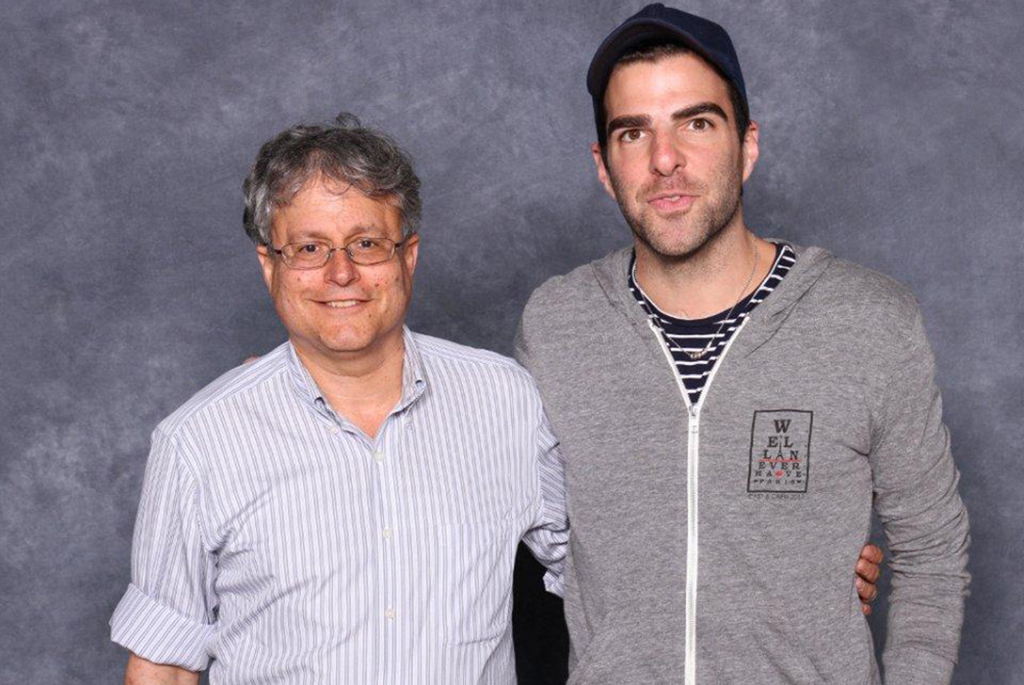
When he was about ten years old, Sandy Fries ‘76 was asked what he wanted to be when he grew up. A fireman? Doctor? Lawyer?
No, he told his inquisitor. “I want to be Walter Cronkite.”
Fries didn’t become the renowned news anchor, but he did learn what went into creating a Cronkite newscast. As an NBC Fellow at the Columbia University School of Journalism, Fries (rhymes with “freeze”) wrote a master’s thesis documenting the work involved in producing the CBS Evening News. His master’s adviser was Fred Friendly, former president of the network.

“Mr. Friendly got me access that has never happened, before or after,” Fries says. He met directors and producers, and had reporters in other countries recording what they were doing in one 24-hour period to create a Cronkite newscast. “There were all sorts of heavy-duty stories going on that day, and based on me being there and doing interviews, and CBS reporters from all over the world giving me notes, I put together a day in the life of the Cronkite newscast.”
In March, Fries released “The Army Behind the Most Trusted Man in America,” an e-book, which is his thesis with added chapters devoted to the current state of news coverage. “While there is some terrific news being done today, things have declined quite a bit in terms of power and quality,” he says. “Studies have shown that the majority of college-aged students get most of their news from Jon Stewart on Comedy Central. Stewart is a great guy, and very clever, but he’s a satirist, not a journalist. That’s troubling.”
An associate professor of mass communication and writing at the College of Dupage in Chicago, Fries has written books, magazine articles, and episodes of television shows, including “Quantum Leap,” “Fame,” and “Thundercats,” along with more than 100 produced scripts for the big three television networks — earning an Emmy nomination for his writing.
“Everything I’ve done is mass-communication oriented — journalism, TV writing. It’s all about communicating with huge numbers of people.” Fries communicated with an exceptionally large number of viewers as a staff writer for “Star Trek: The Next Generation,” recently voted by the Writers’ Guild of America as one of the 101 best-written television shows of all time. He also co-wrote a “Star Trek” novel and was a story editor on ten of the series’ video games — one of which starred William Shatner, whom Fries describes as a “smart, generous, really cool guy.”
Fries learned from Clark Professor James Beard that “writing is only important if it connects with the reader,” and that includes writing for television. He says “Star Trek” creator Gene Roddenberry stressed powerful storytelling with compelling themes surrounding forgiveness, death, and tenacity against bleak odds. But Roddenberry also reminded his writers that their first priority was to make people want to watch the show.
“So throw in the phaser battles and the Klingons battling the Enterprise and all that — otherwise nobody’s going to watch,” Fries recalls Roddenberry saying. “He was completely correct about that.”
Fries even inserted a bit of Clark into the “Star Trek” universe. “When I was at Clark, I wrote a short story about a society in the future where the cultural norm was that everybody was incredibly rude and brusque with each other,” he recalls. “However, there was a top-secret underground group that was very, very polite. They would have secret meetings where they read Louisa May Alcott and drank milk and were very polite to each other. It was kind of a satirical look at the future.”
The story was never published, but years later Fries used it as the basis for one of his “Star Trek” storylines. “I created a character, Mordock the Benzite, who was a complete jerk; he thought that politeness was false, and a weakness. He came out of the short story that I wrote at Clark.” The Benzites appeared in later episodes, and Mordock even earned his own action figure.
At Clark, Fries wrote for The Scarlet, was on the air for WCUW, and led the Speakers’ Forum. He’s proud of having brought a variety of impressive people to campus, including actress Cicely Tyson, Bugs Bunny animator Chuck Jones, Pulitzer Prize-winning journalist David Halberstam, and presidential candidate Jimmy Carter. He interviewed the speakers for The Scarlet and WCUW while they were on campus. “That was one of the coolest things about Clark. If you wanted to do something, you could do it,” he says.
Fries recently visited campus during a visit to Massachusetts. “It took me back to when I was a student, and I remembered what my dreams and goals were then. I was measuring my life based on if I had achieved those goals. To a very significant degree, Clark helped me succeed.”
And in television-writer fashion, he calls stepping into his old dorm room “a Twilight Zone-like experience.”
“The Army Behind the Most Trusted Man in America” is available as an e-book from Amazon.


